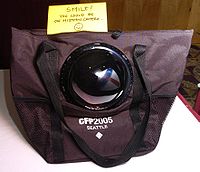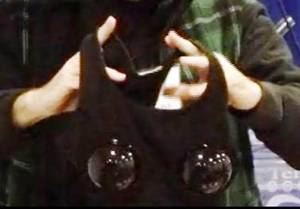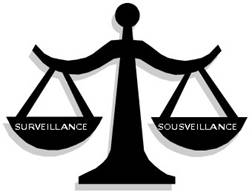Case Study: The Human Rights Travails of Prof. Steve Mann as a Partial Cyborg in 2008
Steve Mann, Ph.D.
Page 2 of 3
There is also the seeing aspect of it, which is the liable-ization framework for where we say, if somebody wants me to take off these glasses they have to take the consequences that I might trip and fall and that they've become liable.
It's an interesting situation, I'm an owner of a condominium, so at a condominium board meeting the person organizing that meeting said I wasn't allowed to wear my eyeglasses to the meeting. I asked them questions like if I trip and fall because I'm not wearing my glasses, which is the way that I normally see the world, and have for the last thirty years, would you be willing to accept liability?
Then there are other questions of memory and perception. The right to sort of construct ones own perceptual framework, how we perceive and understand the world; is it an impairment? I had a letter written by Canada’s former Human Rights Commissioner[1], who is now a lawyer, to address this matter, that wrote the Board members a letter and eventually the issue became resolved.
Another example that's very clean is the
example of the baby in the basement screaming and
yelling. We had a third option like sometimes you
get to a situation where it seems binary but there is a third option. An example like this is at the U.S. Embassy, they say electronic devices are not allowed, so that means people with pacemakers or electric seeing aids  or things that are in their bodies become existential contraband; their mere existence makes them contraband. This notion of the existential contraband is something that came up when I had to pick up my daughter's
passport at the U.S. Embassy as she was born in the United States. They both required me to enter the Embassy to get her passport but forbade me to enter the Embassy because I'm existential contraband. So we had the organization that both required and prohibited my entry.
or things that are in their bodies become existential contraband; their mere existence makes them contraband. This notion of the existential contraband is something that came up when I had to pick up my daughter's
passport at the U.S. Embassy as she was born in the United States. They both required me to enter the Embassy to get her passport but forbade me to enter the Embassy because I'm existential contraband. So we had the organization that both required and prohibited my entry.
It was eventually resolved because they realized the absurdity of this (as it would have made a really interesting newspaper article or something), but it was finally resolved by having their staff come down to the street and serve me on the sidewalk in front of the U.S. Embassy.
These are kinds of examples are very real examples of things that we can construct not just in the hypothetical sense but that become immediate concerns.
I wish to introduce a couple of concepts. As we are talking about Jeremy Bentham's Panopticon[2] I'm thinking of surveillance, which is cameras up on lamp posts or on the ceiling or in architecture. Surveillance, which is from the word French word "sur" meaning from above, and "veilla" which means to watch. Surveillance is a French word that means to watch from above. We can also have its reciprocal, which is sousveillance, which means to watch from below. Surveillance is God's eye view of the world that Jeremy Bentham and Panopticon comes from Britain; Britain is the surveillance capital of the world now. Sousveillance is this more distributed networked Web 3.0[3] sort of peer-to-peer kind of approach where individuals document their own environs and their own experiences.
The bemecam in some sense is a sousveillance camera and we capture our own life as it is in everyday context. Now you don't necessarily have to wear eyeglasses to do sousveillance so I’ll just give a couple examples of sousveillance.
I gave the keynote address at the ACM, the Association of Computing Machinery[4], Computers Freedom and Privacy Conference.[5] One of thethings that we did for fun was to create an inverse panopticon. What is an inverse panopticon? Michel Foucault described Bentham's
Panopticon and imagined what its inverse might be. What we did about that is we made 500 conference bag domes; we had a big dome sewing party with Mitch Kapor[6], founder of Electronic Frontier Foundation[7] and a bunch of people who all got together sewing domes onto bags.
 |
http://en.wikipedia.org/wiki/Computers
We had these laser drilled and sewed them onto bags and gave one to each attendee. Some of them had cameras in them and some of them didn't; wireless Web cams. Some of them had flashing lights in them without cameras, just a little flashing red light. We had this kind of inverse panopticon because in the same reason with a panopticon it’s like a prison planet. We are all prisoners and prisoners need to be on their best behavior at all times because they never know when the guards might be watching them. With this sort of world, the guards have to be on their best behavior at all times because they never know when  the prisoners or the conference attendees might be
watching them. It opened up this question, and some of the people from that conference said, “Oh, this is the best conference bag I've ever had.” A lot of people just throw their conference bags away but this is one that people kept because it's sort
of a work of art that was kind of nice to maintain, and sort of playful. I started out as kind of a scientist trying to explore ways to help people see
better. I've built a lot of seeing aids for blind and visually impaired people in the early days but I unwittingly became what people describe as a cyborg performance artist. I just sort of stumbled upon this world. I'm not really an activist or anything, I'm just an inventor, but in inventing these technologies I came to this real world sort of frame-working and so, as a result of that real world frame-working I started to riff on those ideas and make a bunch more of these sorts of pieces. We talk about the traditional male gaze of the security guards watching women so I kind of made an inverse of that.
the prisoners or the conference attendees might be
watching them. It opened up this question, and some of the people from that conference said, “Oh, this is the best conference bag I've ever had.” A lot of people just throw their conference bags away but this is one that people kept because it's sort
of a work of art that was kind of nice to maintain, and sort of playful. I started out as kind of a scientist trying to explore ways to help people see
better. I've built a lot of seeing aids for blind and visually impaired people in the early days but I unwittingly became what people describe as a cyborg performance artist. I just sort of stumbled upon this world. I'm not really an activist or anything, I'm just an inventor, but in inventing these technologies I came to this real world sort of frame-working and so, as a result of that real world frame-working I started to riff on those ideas and make a bunch more of these sorts of pieces. We talk about the traditional male gaze of the security guards watching women so I kind of made an inverse of that.
 |
I made this inverse kind of camera that reverses that traditional male gaze so that as the men look at the women wearing the camera they become the subjects themselves, subjects of sousveillance. That's one article of clothing the security guards would be really stepping out of bounds to ask the women to remove because to say they aren't allowed to wear that in here, can you take that off, that kind of creates an interesting situation.
From a philosophical view we tried to problematize 'inequavaillance'. I think 'equiveillance' is the balance between surveillance and sousveillance. You can think of
it as the scales of justice, if you will. On one side you have got surveillance and on the other side you've got sousveillance.
 |
It's interesting because sousveillance is not just citizens photographing police like the Rodney King[8] beating or passengers photographing cab drivers or shoppers photographing shopkeepers, but sousveillance in its modern meaning is really defined as the recording of an activity from a participant in the activity. That's the formal legal definition of sousveillance.
Footnotes
[1] Canadian Human Rights Commission - administers the Canadian Human Rights Act and is responsible for ensuring compliance with the Employment Equity Act. Both laws ensure that the principles of equal opportunity and non-discrimination are followed in all areas of federal jurisdiction. http://www.chrc-ccdp.ca/default-en.ASP October 22, 2009 10:45AM EST
[2]Jeremy Bentham’s Panopticon - The [Panopticon] was proposed as a model prison by Jeremy Bentham (1748-1832), a Utilitarian philosopher and theorist of British legal reform. The Panopticon ("all-seeing") functioned as a round-the-clock surveillance machine. Its design ensured that no prisoner could ever see the 'inspector' who conducted surveillance from the privileged central location within the radial configuration. The prisoner could never know when he was being surveilled -- mental uncertainty that in itself would prove to be a crucial instrument of discipline. http://cartome.org/panopticon1.htm October 22, 2009 10:50AM EST
[3]Web 3.0 – [Internet] experts believe that the Web 3.0 browser will act like a personal assistant. As you search the Web, the browser learns what you are interested in. The more you use the Web, the more your browser learns about you and the less specific you'll need to be with your questions. Eventually you might be able to ask your browser open questions like "where should I go for lunch?" Your browser would consult its records of what you like and dislike, take into account your current location and then suggest a list of restaurants. http://computer.howstuffworks.com/web-30.htm October 22, 2009 10:55AM EST
[4]Association of Computing Machinery - the world’s largest educational and scientific computing society, delivers resources that advance computing as a science and a profession. ACM provides the computing field's premier Digital Library and serves its members and the computing profession with leading-edge publications, conferences, and career resources.
[5]Computers Freedom and Privacy Conference - The 20th ACM Computers, Freedom, and Privacy conference is the leading policy conference exploring the impact of the Internet, computers and communications technologies on society. We focus on topics such as freedom of speech, privacy, digital rights and responsibilities, free culture and intellectual property, cybersecurity, electronic democracy, anonymity, and the future of technologies and their implications. http://cfp.acm.org/wordpress/?page_id=2 October 22, 2009 11:23AM EST
[6]Mitch Kapor - a pioneer of the personal computing revolution and has been at the forefront of information technology for 30 years as an entrepreneur, software designer, angel investor, and activist. He is widely known as founder of Lotus Development Corporation and the designer of Lotus 1-2-3, the "killer application" which made the personal computer ubiquitous in the business world in the 1980s. http://www.kapor.com/bio/index.html October 22, 2009 11:29AM EST
[7]Electronic Frontier Foundation – Touted as the first line of defense, EFF broke new ground when it was founded in 1990 — well before the Internet was on most people's radar — and continues to confront cutting-edge issues defending free speech, privacy, innovation, and consumer rights today. From the beginning, EFF has championed the public interest in every critical battle affecting digital rights. http://www.eff.org/about October 22, 2009 11:34AM EST
[8]Rodney King - (born April 2, 1965 in Sacramento, California) is a Black American who, on March 3, 1991, was the victim of police brutality, committed by Los Angeles police officers. A bystander, George Holliday, videotaped much of the incident from a distance. http://en.wikipedia.org/wiki/Rodney_King October 23, 2009 11:27AM EST
1 2 3 next page>